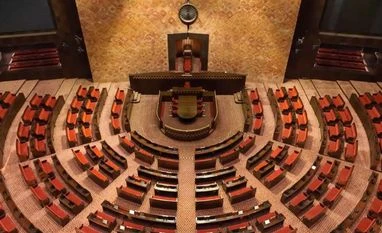Prime Minister Narendra Modi will on Sunday inaugurate the new Parliament building, equipped with state-of-the-art technology, amid a boycott by several Opposition parties which insist that President Droupadi Murmu as head of the state should do the honours.
On Friday, Modi said the new Parliament building will make every Indian proud and shared a video of the new complex.
With carpets from Mirzapur in Uttar Pradesh, bamboo flooring from Tripura and stone carvings from Rajasthan, the new Parliament building reflects India's diverse culture.
'Sengol', a historical sceptre from Tamil Nadu which was received by first Prime Minister Jawaharlal Nehru to represent transfer of power from the British and was kept in a museum in Allahabad, will be installed in the new Parliament building.
It will be placed near the chair of Lok Sabha Speaker in the House chamber.
But amid a boycott by 20 opposition parties of the inauguration ceremony, the Sengol too was dragged into the political row.
More From This Section
Congress leader Jairam Ramesh on Friday claimed there was no documented evidence of Lord Mountbatten, C Rajagopalachari and Nehru describing the Sengol as a symbol of transfer of power by the British to India.
The Congress' stand on the Sengol evoked a strong reaction from Home Minister Amit Shah who said the party needs to "reflect" on its behaviour as he denounced its claim that there was no evidence of the Sengol being a symbol of transfer of power by the British to India in 1947.
To mark the event, the government will issue a commemorative Rs 75 coin. According to a gazette notification by Department of Economic Affairs under the finance ministry, the weight of this coin could be 34.65-35.35 gram.
One side of the coin will bear the image of Lion Capital of Ashoka Pillar in the centre flanked by the word 'Bharat' in Devnagri script and 'INDIA' in English, it said.
Rupee symbol '?' and denominational value '75' in international numeral will also be inscribed below the Lion Capital.
The other side of the coin shall bear the image of Parliament Complex, and the year '2023' in international numeral below the image.
The new Parliament building, constructed by Tata Projects Ltd, will have a grand constitution hall to showcase India's democratic heritage, a lounge for MPs, a library, multiple committee rooms, dining areas and ample parking space.
The triangular-shaped four-storey building has a built-up area of 64,500 square metres.
The building has three main gates -- Gyan Dwar, Shakti Dwar, and Karma Dwar.
It will have separate entrances for VIPs, MPs, and visitors.
The material used for the new building has been acquired from various parts of the country.
The teakwood used in the building was sourced from Nagpur in Maharashtra, while the red and white sandstone was procured from Sarmathura in Rajasthan. The sandstone for the Red Fort and Humayun's Tomb in the national capital was also known to have sourced from Sarmathura.
The Kesharia green stone has been procured from Udaipur, the red granite from Lakha near Ajmer and the white marble has been sourced from Ambaji in Rajasthan.
"In a way, the entire country came together to construct the temple of democracy, thus reflecting the true spirit of Ek Bharat Shreshtha Bharat," an official said.
The steel structure for the false ceilings in the Lok Sabha and the Rajya Sabha chambers have been sourced from the union territory of Daman and Diu, while the furniture in the new building was crafted in Mumbai.
The stone 'jaali' (lattice) works dotting the building were sourced from Rajnagar in Rajasthan and Noida in Uttar Pradesh.
The materials for the Ashoka Emblem were sourced from Aurangabad in Maharashtra and Jaipur in Rajasthan, while the Ashok Chakra donning the massive walls of the Lok Sabha and the Rajya Sabha chambers and the exteriors of the parliament building were procured from Indore in Madhya Pradesh.
The new parliament building used manufactured sand or M-sand from Charkhi Dadri in Haryana for creating concrete mix for the construction activities.
M-Sand is considered environment friendly as it is manufactured by crushing large hard stones or granite and not by dredging of river beds.
The fly ash bricks used in the construction were sourced from Haryana and Uttar Pradesh, while brass works and pre-cast trenches were from Ahmedabad in Gujarat.
The new Parliament building can comfortably seat 888 members in the Lok Sabha chamber and 300 in the Rajya Sabha chamber.
In case of a joint sitting of both the Houses, a total of 1,280 members can be accommodated in the Lok Sabha chamber.
The prime minister had laid the foundation stone of the new parliament building on December 10, 2020.
The present Parliament building was completed in 1927, and is now 96 years old.
Over the years, the old building was found to be inadequate for present day requirements.
Lok Sabha and Rajya Sabha had passed resolutions urging the government to construct a new building for Parliament.
The existing building served as independent India's first Parliament and witnessed the adoption of the Constitution.
Originally called the Council House, the building housed the Imperial Legislative Council. The Parliament building witnessed the addition of two floors in 1956 to address the demand for more space.
In 2006, the Parliament Museum was added to showcase the 2,500 years of rich democratic heritage of India.
Officials said the present building was never designed to accommodate a bicameral legislature and the seating arrangements were cramped and cumbersome, with no desks beyond the second row.
The Central Hall has seating capacity only for 440 people and the need for more space was acutely felt during joint sittings of both the houses.
)